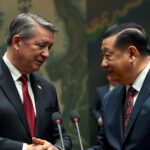Pro-Democracy Icons Sentenced in Hong Kong’s National Security Trial
Hong Kong’s court has sentenced leading pro-democracy activists, including Benny Tai and Joshua Wong, to significant jail terms for subversion. This follows a national security trial involving 47 individuals. The legal proceedings are viewed as a tactic to diminish opposition and establish government control, raising international concerns about the erosion of democracy in the region.
A Hong Kong court has imposed lengthy prison sentences on leading pro-democracy figures, including Benny Tai and Joshua Wong, in a landmark subversion case. Tai was sentenced to ten years, while Wong received more than four years, both relating to their involvement in a plan to select opposition candidates for local elections. This verdict is part of a trial involving 47 individuals associated with the pro-democracy movement, a stark application of the national security law introduced by Beijing following the protests in 2019. The national security law has elicited considerable criticism from international human rights observers and political analysts, who argue that it represents a significant blow to Hong Kong’s pro-democracy efforts and the rule of law. Authorities in Beijing and Hong Kong assert that the legislation is vital for preserving stability, contending that the convicted individuals attempted to subvert the government rather than engage in legitimate political discourse. The interests of the local populace were evident, as many queue outside the courthouse to witness the proceedings, highlighting the case’s profound public significance. Prominent figures such as Gwyneth Ho, Claudia Mo, and Leung Kwok-hung were also sentenced, further consolidating the perception that the pro-democracy movement is under severe threat. The 2020 unofficial primary, organized by activists to bolster opposition against a pro-Beijing legislative agenda, has been characterized by officials as instigating a potential constitutional crisis. The accusations against the activists stress an alleged attempt to overthrow the government. These developments reflect an ongoing struggle for political expression and civil liberties in Hong Kong, raising questions about the future of democratic participation in the region.
The sentencing of pro-democracy activists in Hong Kong comes against the backdrop of heightened tensions between the local population and the Chinese government. Following widespread pro-democracy protests in 2019, Beijing enacted a national security law that has since been interpreted broadly to suppress dissent. This legal framework has been utilized in numerous cases against activists, raising alarms regarding the erosion of civil liberties and judicial independence in the region. The collective sentencing of the Hong Kong 47 clearly illustrates the authorities’ efforts to quash opposition and assert control over the city’s political landscape.
In conclusion, the recent sentencing of prominent pro-democracy figures in Hong Kong represents a pivotal moment in the ongoing conflict between local activists and the Chinese government. The application of the national security law underscores a notable shift towards stricter measures against political dissent, ultimately threatening the region’s long-standing democratic aspirations. As the international community observes these developments, the implications for future civil liberties and political engagement in Hong Kong remain concerning.
Original Source: www.bbc.com







Post Comment